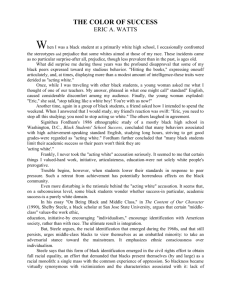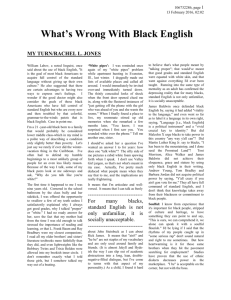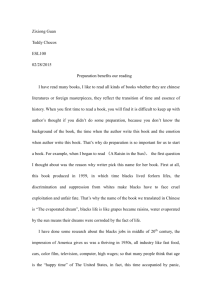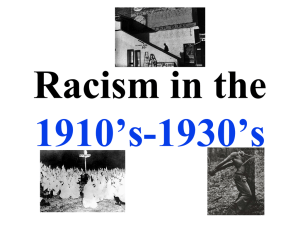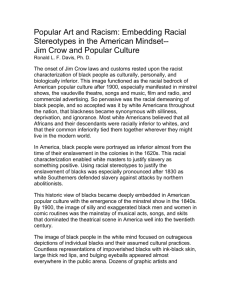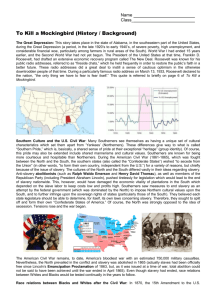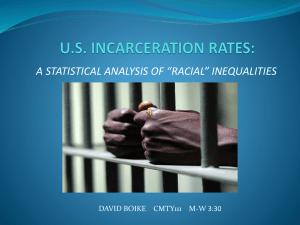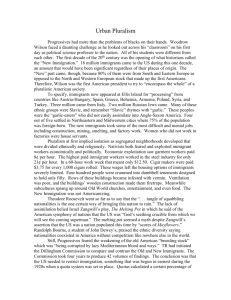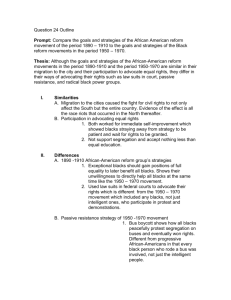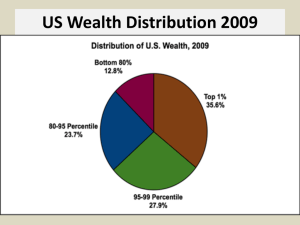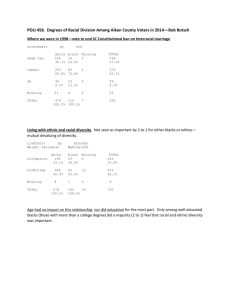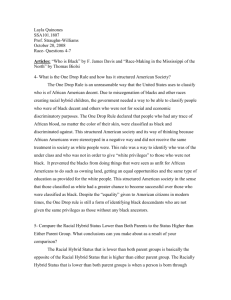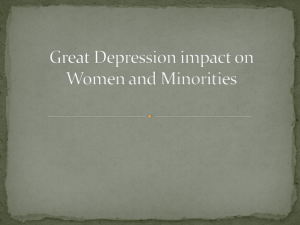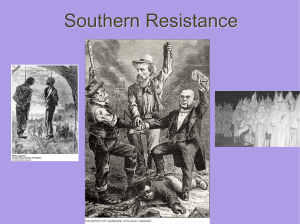Eric A. Watts “The Color of Success” When I was a black student at a
advertisement
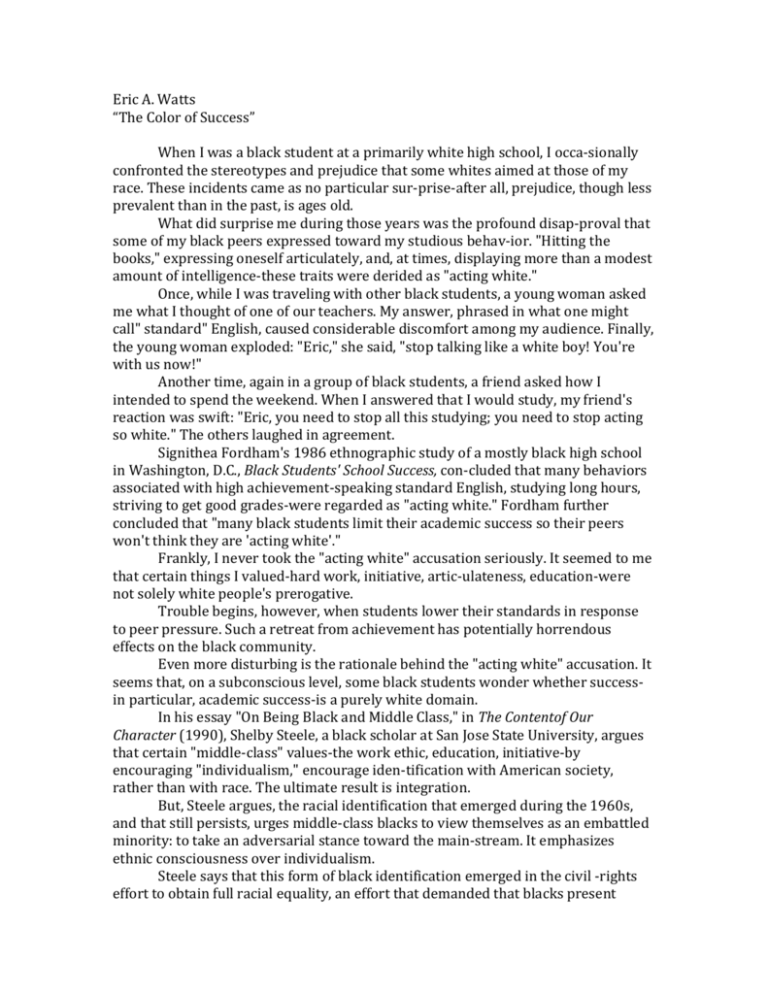
Eric A. Watts “The Color of Success” When I was a black student at a primarily white high school, I occa-sionally confronted the stereotypes and prejudice that some whites aimed at those of my race. These incidents came as no particular sur-prise-after all, prejudice, though less prevalent than in the past, is ages old. What did surprise me during those years was the profound disap-proval that some of my black peers expressed toward my studious behav-ior. "Hitting the books," expressing oneself articulately, and, at times, displaying more than a modest amount of intelligence-these traits were derided as "acting white." Once, while I was traveling with other black students, a young woman asked me what I thought of one of our teachers. My answer, phrased in what one might call" standard" English, caused considerable discomfort among my audience. Finally, the young woman exploded: "Eric," she said, "stop talking like a white boy! You're with us now!" Another time, again in a group of black students, a friend asked how I intended to spend the weekend. When I answered that I would study, my friend's reaction was swift: "Eric, you need to stop all this studying; you need to stop acting so white." The others laughed in agreement. Signithea Fordham's 1986 ethnographic study of a mostly black high school in Washington, D.C., Black Students' School Success, con-cluded that many behaviors associated with high achievement-speaking standard English, studying long hours, striving to get good grades-were regarded as "acting white." Fordham further concluded that "many black students limit their academic success so their peers won't think they are 'acting white'." Frankly, I never took the "acting white" accusation seriously. It seemed to me that certain things I valued-hard work, initiative, artic-ulateness, education-were not solely white people's prerogative. Trouble begins, however, when students lower their standards in response to peer pressure. Such a retreat from achievement has potentially horrendous effects on the black community. Even more disturbing is the rationale behind the "acting white" accusation. It seems that, on a subconscious level, some black students wonder whether successin particular, academic success-is a purely white domain. In his essay "On Being Black and Middle Class," in The Contentof Our Character (1990), Shelby Steele, a black scholar at San Jose State University, argues that certain "middle-class" values-the work ethic, education, initiative-by encouraging "individualism," encourage iden-tification with American society, rather than with race. The ultimate result is integration. But, Steele argues, the racial identification that emerged during the 1960s, and that still persists, urges middle-class blacks to view themselves as an embattled minority: to take an adversarial stance toward the main-stream. It emphasizes ethnic consciousness over individualism. Steele says that this form of black identification emerged in the civil -rights effort to obtain full racial equality, an effort that demanded that blacks present themselves (by and large) as a racial monolith: a single mass with the common experience of oppression. So blackness became virtually synonymous with victimization and the characteristics associ-ated with it: lack of education and poverty. I agree with Steele that a monolithic form of racial identification persists. The ideas of the black as a victim and the black as inferior have been too much entrenched in cultural imagery and too much enforced by custom and law not to have damaged the collective black psyche. This damage is so severe that some black adolescents still believe that success is a white prerogative-the white "turf." These young people view the turf as inaccessible, both because (among other reasons) they doubt their own abilities and because they generally envision whites as, if not outspoken racists, people who are mildly interested in "keeping blacks down." The result of identifying oneself as a victim can be, "Why even try? It's a white man's world." Several years ago I was talking to an old friend, a black male. He justified dropping out of school and failing to look for a job on the basis of one factor: the cold, heartless, white power structure. When I sug-gested that such a power structure might indeed exist, but that oppor-tunity for blacks was at an unprecedented level, he laughed. Doomed, he felt, to a life of defeat, my friend soon eased his melancholy with crack. The most frustrating aspect of the "acting white" accusation is that its main premise-that academic and subsequent success are "white" -is demonstrably false. And so is the broader premise: that blacks are the victims of whites. That academic success is "not black" is easily seen as false if one takes a brisk walk through the Brown University campus and looks at the faces one passes. Indeed, the most comprehensive text concerning blacks in decades, A Common Destiny (1989), states, "Despite large gaps…whether the baseline is the 1940s, 1950s, or 1960s, the achievement outcomes…of black schooling have greatly improved." That subse-quent success in the world belongs to blacks as well as whites is exem-plified today by such blacks as Jesse Jackson, Douglas Wilder, Norman Rice, Anne Wortham, Sara Lawrence Lightfoot, David Dinkins, August Wilson, Andrew Young… The idea of a victimized black race is slowly becoming outdated. Today's black adolescents were born after the Brown v. Board of Education decision of 1954; after the passage of the Civil Rights Act; after the Economic Opportunity Act of 1964. With these rulings and laws, whites' attitudes toward blacks have also greatly improved. Although I cannot say that my life has been free of racism on the part of whites, good racial relations in my experience have far outweighed the bad. I refuse to apologize for or retreat from this truth. The result of changes in policies and attitudes has been to provide more opportunities for black Americans than at any other point in their history. As early as 1978, William Julius Wilson, in The Declining Sig-nificance of Race, concluded that "the recent mobility patterns of blacks lend strong support to the view that economic class is clearly more impor­tant than race in predetermining… occupational mobility." There are, of course, many factors, often socioeconomic, that still impede the progress of blacks. High schools in black neighborhoods receive less local, state, and federal support than those in white areas; there is evidence that the high school diplomas of blacks are little valued by employers. We should rally against all such remaining racism, confronting par-ticularly the economic obstacles to black success. But we must also realize that racism is not nearly as profound as it once was, and that opportu-nities for blacks (where opportunity equals jobs and acceptance for the educated and qualified) have increased. Furthermore, we should know that even a lack of resources is no excuse for passivity. As the syndicated columnist William Raspberry (who is black) says, it is time for certain black adolescents to "shift their focus": to move from an identity rooted in victimization to an identity rooted in individ-ualism and hard work. Simply put, the black community must eradicate the "you're-acting -white" syndrome. Until it does, black Americans will never realize their potential.
